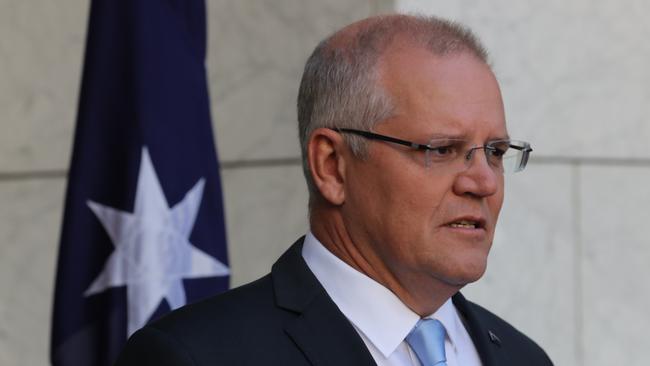
It’s also about how Australians decide to define the traditional idea of what is a “fair go”.
For once, Australia’s national politicians have worked hard and bravely to offer an end to bland campaigns judged on personality, “small targets” and “gotcha moments” through a real choice to determine the fate of the nation over the next decade.
Ironically, given the stark and vital choice now on offer, Scott Morrison and Bill Shorten have embarked on the election campaign with the same aims: a “fair go” for everyone and making “Australia stronger”.
The Prime Minister and Opposition Leader also agree the economy is central to achieving these aims and they are adamant, correctly, that this election involves a huge choice.
What’s more, in an age of global political disruption, rising minor parties and third-party activists and extremists, the two leaders are adopting classic Liberal and Labor philosophical approaches to how they define a “fair go” and how that fair go is paid for.
For Morrison, the idea of a fair go is to give a fair go to those “who have a go” in the Liberal sense of individualism, enterprise and mutual obligation seeking to “make a contribution, not ask for one”.
For Shorten, the idea of a fair go is to have “the country working in the interests of everyone, not just the top end of town” and to achieve that through redistributing the wealth of the “top end of town” to those on lower incomes.
The Liberal and Labor leaders also agree that Australia faces a crucial choice at the election, which will shape the economics and politics of the decade to come.
Morrison said voters face a choice that will determine “the economy that Australians live in, not just for the next three years but for the next decade” while Shorten declared: “Australians face a real and vital choice at this election.”
The crux of that choice is how Morrison and Shorten disagree completely on how those aims can be achieved and implemented.
Again, like no election this century, the Liberal and Labor parties are offering central economic agendas to make “Australia stronger/better/safer” based on traditional philosophies and appeals to their natural supporters.
Morrison and Shorten have appealed for a “fair go” for everyone but their definition of what is a “fair go” and how their respective parties would achieve that “fair go” is where they part ways.
Morrison, announcing the election from the prime ministerial courtyard flanked closely by Australian flags, is putting his faith and political life in the traditional Liberal belief that a strong economy will create business, growth and jobs and individual enterprise while pointing to the Coalition’s “record” on economic management.
Shorten, with his feet “planted firmly in a backyard”, is putting his faith and political life in the traditional Labor belief that the “big end of town” has to pay through tax for services and support for those without “much in the bank”.
Morrison, harking back to more successful Coalition governments, highlights “cleaning up Labor’s mess”, returning to budget surplus, creating jobs, boosting investment and growth in an appeal to mutual obligation for voters who deserve a “fair go” if they “have a go”. “I believe in a fair go for those who have a go,” was Morrison’s kicker on equity.
Shorten’s appeal was aimed at a “fair go” for workers who feel wages are “stagnating”, families facing cost-of-living pressures and through more spending on services such as education and health, including his centrepiece cancer care package, paid for by the “top end of town”.
“Do you want Labor’s energy versus the government’s tiredness? Labor’s focus on the future versus being stuck in the past? Labor’s positive plan for all Australians or a negative fear campaign from the other side? Do you want a united government under Labor or another three years of division following the last six years of division under the current government?” was Shorten’s appeal to Labor voters and a slice at Liberal disunity.
Morrison had his own dip at Shorten’s unpopularity with: “It is a choice that will determine the economy … It’s a choice between a government that I lead and the alternative of a Labor government led by Bill Shorten.”
The voters’ choice will define what is now considered a fair go and how it is to be financed.




The May 18 election is about the people, the voters of Australia making a real choice and standing up for themselves, their civic duty and the future.